- June 26, 2021
- by:
- in: Blog
Welcome back to This Week in Apps, the weekly TechCrunch series that recaps the latest in mobile OS news, mobile applications and the overall app economy. The app industry continues to grow, with a record 218 billion downloads and $143 billion in global consumer spend in 2020. Consumers last year also spent 3.5 trillion minutes using apps on Android devices
Welcome back to This Week in Apps, the weekly TechCrunch series that recaps the latest in mobile OS news, mobile applications and the overall app economy.
The app industry continues to grow, with a record 218 billion downloads and $143 billion in global consumer spend in 2020. Consumers last year also spent 3.5 trillion minutes using apps on Android devices alone. And in the U.S., app usage surged ahead of the time spent watching live TV. Currently, the average American watches 3.7 hours of live TV per day, but now spends four hours per day on their mobile devices.
Apps aren’t just a way to pass idle hours — they’re also a big business. In 2019, mobile-first companies had a combined $544 billion valuation, 6.5x higher than those without a mobile focus. In 2020, investors poured $73 billion in capital into mobile companies — a figure that’s up 27% year-over-year.
This week, there’s big news with the expansion of Android apps to Windows. Apple also came out swinging against sideloading and expanded its profitable Search Ads business to China…with more than a few caveats. Meanwhile, TikTok launched its own take on mini-apps after tests, making its videos more interactive.
This Week in Apps will soon be a newsletter! Sign up here: techcrunch.com/newsletters
Top Stories
Microsoft brings Android apps to Windows 11
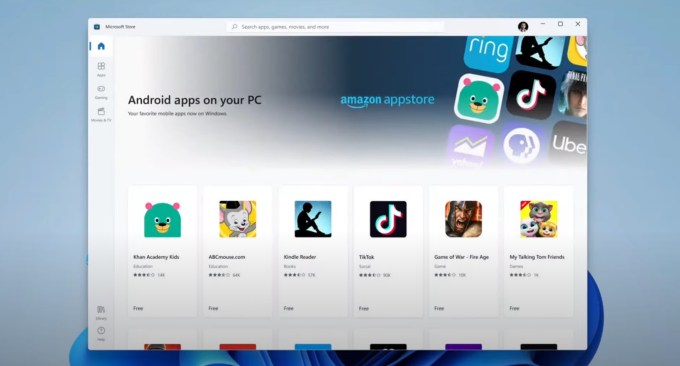
Image Credits: Microsoft
Microsoft surprised industry observers this week at its Windows 11 event with news that it will make Android apps available on the next version of its operating system. The apps will run natively on Windows 11 and can be downloaded from Amazon’s Appstore through the new Windows Store included in the updated OS. They’ll also be able to be integrated into the Start menu and pinned to the taskbar, and can tile or “window” as part of the OS’s new application placement user interface.
The Amazon partnership will bring increased attention to the Amazon Appstore, whose importance has somewhat fizzled over the years given the general lack of investment and its close ties to Amazon Fire devices, which are outsold by iPad. App developers today tend to focus initially on the App Store and Google Play, not Amazon’s Appstore. However, bringing some 3 million Android apps to Windows users opens up a huge new potential market for Android. But could it actually make coding for “iOS first” less of a given for certain types of applications — like those that complement the productivity environment enabled by a Windows PC, perhaps?
In the near-term, more consumers may begin to sideload the Amazon Appstore app on their Android devices for their paid app installs in order to gain access to the cross-platform support a Google Play version would not necessarily provide.
Microsoft noted during the event that it’s partnering with Intel to use its Intel Bridge technology to make this Appstore integration possible on x86 systems. However, the Intel-powered apps will also run on AMD and Arm processors, The Verge noted, though the technical details of how that will work were not immediately available.
Microsoft during the event demonstrated how the app integration would work by showing off TikTok running in a vertical format on the new Windows OS. This may not have been the best example, as TikTok has a fairly usable website for watching videos. Meanwhile, the image of the Amazon Appstore in the Windows Store showed other apps including those from Ring, Uber, Yahoo, Khan Academy, Kindle, Game of War: Fire Age, My Talking Tom Friends, and more, which indicates this is a comprehensive rollout.
Ahead of this news, Amazon announced it would soon lower its cut on app developer revenues from 30% to 20%, as part of a new program for small businesses. The program, which also includes promotional credits for AWS, could help boost developer support for the Appstore. Plus, on the larger Windows Store, non-game developers can keep 100% of their revenue if they use their own payment platforms for in-app purchases. Apps and games using Microsoft’s payment platform split revenue with the company at 85%/15% and 88%/12%, respectively. This sort of commission structure combined with the introduction of Android apps makes the Windows Store seem more developer-friendly than Apple’s App Store, which Microsoft likely hopes will keep it out of antitrust crosshairs.
Apple launches Search Ads in China
Apple this week brought its search advertising business to China five years after its U.S. debut. The system allows developers to bid on an advertising slot based on keywords users search for in the App Store. Though the move opens up a major new market for app developers, the system in China is fairly complex and comes with several caveats. Developers will need to upload documents, including business licenses and other files, that confirm their account has been approved before being able to run ads. Apple may then submit these documents to third-party databases and government entities for validation.
According to Apple’s guidelines, the industry-specific licenses required exclude most foreign businesses from directly advertising in mainland China. Instead, they’ll need to work with local partners who will run ads on their behalf.
The expansion for now only includes the Search Ads in the App Store and not the newly added Search Tab ads, where developers can bid on a slot directly on the Search tab in the App Store itself.
Weekly News
Platforms: Apple
Apple released iOS 15 beta 2 and iPadOS 15 beta 2 for app developers. New features include support for SharePlay, updated Memoji outfits, a new Maps icon, a welcome screen in the updated Weather app, access to launch Quick Note with a swipe from bottom-right on iPad, Shortcuts improvements, bug fixes for iCloud Private Relay, and more. WatchOS 8 beta 2 was also released.
The iOS 15 beta code also revealed Apple is working on a feature that will allow users to update to a beta release when restoring a device from backup instead of being told that you can’t use backups of newer iOS versions.
iOS and iPad apps will now be able to request privileged access to more RAM in iOS 15, exceeding normal system memory limits, 9to5Mac also discovered.
 Apple this week published a white paper (PDF) where it presents its argument against any legislation that would force the company to allow sideloading of apps on iOS or iPadOS devices outside its App Store. While there are consumer benefits to allowing for choice — like getting your hands on apps that don’t fit Apple’s rules, for example — Apple makes the case that sideloading could compromise user privacy and security in a number of ways, including potentially opening up users to being scammed and making it more difficult for parents to lock down kids’ iPhones, among other things. Pirated apps could also eat into legitimate developer revenue, not to mention Apple’s own. Apple’s Director of User Privacy Erik Neuenschwander went into further detail with Fast Company about Apple’s position, noting attackers could even trick users into thinking they were downloading from the App Store when they were not.
Apple this week published a white paper (PDF) where it presents its argument against any legislation that would force the company to allow sideloading of apps on iOS or iPadOS devices outside its App Store. While there are consumer benefits to allowing for choice — like getting your hands on apps that don’t fit Apple’s rules, for example — Apple makes the case that sideloading could compromise user privacy and security in a number of ways, including potentially opening up users to being scammed and making it more difficult for parents to lock down kids’ iPhones, among other things. Pirated apps could also eat into legitimate developer revenue, not to mention Apple’s own. Apple’s Director of User Privacy Erik Neuenschwander went into further detail with Fast Company about Apple’s position, noting attackers could even trick users into thinking they were downloading from the App Store when they were not.
Platforms: Google
Google’s Android Essentials is now generally available through additional partners in the U.S., the U.K, Japan, France and Germany, with more countries coming soon after a more limited testing period. Essentials makes it easier for companies to manage and secure Android devices in the workplace by enabling features like remote wiping of lost or stolen devices, enforcing a screen lock, and preventing sideloading of applications.
Google opened its Play Media Experience Program globally. The program allows developers to invest in scaling their services beyond mobile to reach other devices including experiences across Video (Android TV, Google TV, Google Cast); Audio (Wear OS, Android Auto, Android TV, Google Cast); and Books (tablets, foldables, integration with the new Entertainment Space.)
E-commerce
Facebook announced a trio of new commerce features this week, including the expansion of its Shops service to WhatsApp as well as Marketplace in the U.S.; Shop Ads, including AR try-on ads in the U.S., and an A.I.-based Visual Search feature on Instagram, where users can upload photos to find similar items.
Augmented Reality
Apple launches an AR-enabled Snapchat Lens to promote Apple Pay Express Transit in New York. The Lens lets users ride the subway through Kings Theater in Flatbush, the Sea Glass Carousel in Battery Park, and the Great Hall at the New York City Hall of Science.
TikTok and Spotify teamed up with makeup brand MAC on a digital campaign that offers an AR lens with lip colors users can virtually try on. The campaign involves MAC’s Love Me Liquid Lipcolor and is running in the U.K. across both apps.
Social
TikTok launched its own mini-app integrations. With its new Jump feature, creators can add interactive third-party integrations to their videos from services like Whisk, Quizlet, Breathwrk, StatMuse, Tabelog, BuzzFeed, Jumprope, IRL and WATCHA.
Instagram said it’s testing a new feature in English-speaking markets that will mix Suggested Posts into your Feed. The company will use its algorithmic suggestions to help point people to accounts they may want to follow, with an apparent goal of increasing time spent in the app.
Twitter announced a new feature will make it possible to share tweets directly to Instagram Stories. To use the feature, which is only on iOS for now, you’ll tap the share icon on a tweet and select “Instagram Stories.” When the Instagram app opens, you can resize or reposition the tweet sticker before posting.
Snap made a deal with Universal Music Group. The deal allows Snapchat users to add song clips from the UMG catalog to their Snaps and on Spotlight, Snap’s TikTok rival.
Twitter has opened up applications for U.S. users who want to test its Ticketed Spaces and Super Follows features. The company said only a “small group” will be able to test the features for the time being. Super Follows lets creators charge $2.99, $4.99, or $9.99 per month for exclusive content. Ticketed Spaces lets creators charge between $1-$999 for access to live audio rooms.
Messaging
Newly relaunched mobile app Squad debuted an audio-based mobile messenger that allows friends to send voice messages to one another that expire after 14 hours.
Dating
After a handful of competitors took on Tinder with video-based dating, Tinder this week introduced a feature that allows daters to upload up to nine videos to their profiles. It also added a speed-dating feature called “Hot Takes” that lets unmatched users chat for a short period before swiping left or right, from 6 pm to midnight on weekdays.
Streaming & Entertainment
YouTube for iOS is officially gaining support for picture-in-picture in the U.S. The feature will allow all users, both free and paid, to watch YouTube while using other apps on their iPhone.
Clubhouse was spotted working on DM text chat feature called Backchannel that would allow users a new way to connect.
Kuaishou, the operator of China’s second-largest short-form video app behind TikTok (Douyin in China), reaches 1 billion monthly active users. The company says the MAU figure includes all of its existing platforms in China, plus its Kwai and Snack Video apps in international markets.
Wattpad and WEBTOON merged their studio divisions to create Wattpad WEBTOON Studios. The deal follows South Korea-based Naver’s recent acquisition of Wattpad in a transaction estimated to be more than USD$600 million, which aligns the two storytelling and entertainment divisions. Both will benefit from the company’s data-driven approach to sourcing content from storytelling apps to turn into TV shows, movies and books.
Gaming
New titles came to Google Stadia, including Madden NFL 2022 — the first sports title to launch on a cloud gaming platform. Google Stadia’s Android TV app also launched on the Play Store with a “Coming Soon” message.
Player spending in U.S. mobile sports games rose 16% year-over-year to $648.8 million, according to Sensor Tower data. The top app by player spending in the U.S. between June 1, 2020 and May 31, 2021 was Golf Clash from Playdemic, which generated $132.8 million. The No. 2 and No. 3 grossing Sports titles were 8 Ball Pool from Miniclip and Fishing Clash from Ten Square Games.
More than half of the $175 billion earned by the games industry this year will come from mobile games, per Newzoo and Arm’s annual report. Mobile games will be increasingly high-fidelity and cross-platform, the report said.
Classic mobile game Jetpack Joyride is also being added to Apple Arcade, following a recent announcement that more classic games would be soon added to the subscription gaming service.
Health & Fitness
Google and the state of Massachusetts got busted by silently installing the state’s COVID-tracking service, MassNotify, on users’ devices without consent. The auto-installed version isn’t an app and instead is only available as a setting users could enable or disable.
Government & Policy
Indian microblogging app Koo is selling itself as a partisan Twitter alternative in Nigeria by supporting government restrictions on social media platforms.
A French court has set a date in the case over allegedly abusive App Store developer contracts brought by the finance ministry against Apple. The hearing will take place Sept 17, 2021, and could influence Apple’s decision to change developer terms and agreements.
Google may soon face antitrust claims over its Play Store from several U.S. states, Reuters reported. A group of state attorneys general may file a lawsuit against Google as early as next week, the report claims, citing sources. The investigation is being led by Utah, Tennessee, North Carolina and New York.
Security & Privacy
Enterprise customers using Jamf to manage Macs gained access to a new Jamf Unlock app for iPhone, which allows users to unlock their Macs using Face ID on their iPhone.
Funding and M&A
 MAJORITY raised $19 million in seed funding for its mobile banking service for migrants. The app offers a $5 per month subscription that offers an FDIC-insured bank account, debit card, mobile credit, and at-cost international calls. The round was led by Valar Ventures, with participation from Avid Ventures, Heartcore Capital and several Nordic fintech founders.
MAJORITY raised $19 million in seed funding for its mobile banking service for migrants. The app offers a $5 per month subscription that offers an FDIC-insured bank account, debit card, mobile credit, and at-cost international calls. The round was led by Valar Ventures, with participation from Avid Ventures, Heartcore Capital and several Nordic fintech founders.
 Mobile commerce startup Via raised $15 million in Series A funding for its suite of mobile marketing tools for e-commerce apps. The round was led by led by Footwork, the new venture firm co-founded by former Stitch Fix COO Mike Smith and former Shasta Ventures investor Nikhil Basu Trivedi. The startup has generated $51 million in sales since May 2020.
Mobile commerce startup Via raised $15 million in Series A funding for its suite of mobile marketing tools for e-commerce apps. The round was led by led by Footwork, the new venture firm co-founded by former Stitch Fix COO Mike Smith and former Shasta Ventures investor Nikhil Basu Trivedi. The startup has generated $51 million in sales since May 2020.
 Viva Republica, the maker of Korean financial super app Toss, raised $410 million at a $7.4 billion valuation. The app offers standard neobanking features, as well as P2P payments, money transfers, loans and more.
Viva Republica, the maker of Korean financial super app Toss, raised $410 million at a $7.4 billion valuation. The app offers standard neobanking features, as well as P2P payments, money transfers, loans and more.
 Sporttrade raised $36 million for its sports betting and stock trading combo service, which is set to release its app in New Jersey later this year. Investors included former heads of Nasdaq and MGM Resorts.
Sporttrade raised $36 million for its sports betting and stock trading combo service, which is set to release its app in New Jersey later this year. Investors included former heads of Nasdaq and MGM Resorts.
 EA is acquiring Warner Bros. Games’ Playdemic mobile games studio for $1.4 billion in cash. Playdemic is best known for “Golf Clash,” a top mobile game in the U.S. and U.K. with over 80 million installs to date.
EA is acquiring Warner Bros. Games’ Playdemic mobile games studio for $1.4 billion in cash. Playdemic is best known for “Golf Clash,” a top mobile game in the U.S. and U.K. with over 80 million installs to date.
 Charlotte, N.C.-based mobile payments platform Payzer raised $19.5 million according to an SEC filing. The company offers an end-to-end management platform for contractors on a subscription basis.
Charlotte, N.C.-based mobile payments platform Payzer raised $19.5 million according to an SEC filing. The company offers an end-to-end management platform for contractors on a subscription basis.
 Happs raised $4.7 million in post-seed funding for its multicast livestream platform aimed at the creator economy. Users can broadcast live to Facebook, YouTube, Twitter and Twitch simultaneously via the app, and view live comments from all supported social media sites.
Happs raised $4.7 million in post-seed funding for its multicast livestream platform aimed at the creator economy. Users can broadcast live to Facebook, YouTube, Twitter and Twitch simultaneously via the app, and view live comments from all supported social media sites.
 Amazon’s AWS is acquiring the secure messaging app Wickr, which has been providing services to government and military groups and enterprises. Wickr had raised just under $60 million in funding, per Pitchbook data.
Amazon’s AWS is acquiring the secure messaging app Wickr, which has been providing services to government and military groups and enterprises. Wickr had raised just under $60 million in funding, per Pitchbook data.
Downloads
Brave
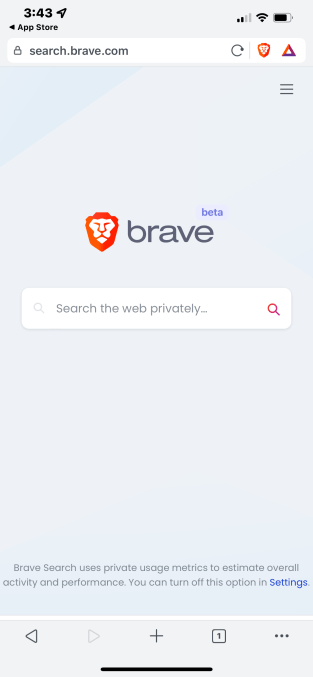
Image Credits: Brave
Alternative browser Brave this week introduced its own search service, Brave Search, now available in beta across all platforms — including web, Android and iOS. The service is different from other search engines because it does not track or profile users, and it leverages its own search index for answering queries instead of relying on other providers. Its ranking algorithms will be community-curated and open. Soon, it will also offer options for both an ad-free paid search and an ad-supported search option, allowing users to decide how they want to proceed.
Brave Search was announced in March when Brave acquired Tailcat. The company says the new service will later this year become the default in the Brave browser.
Moonbeam
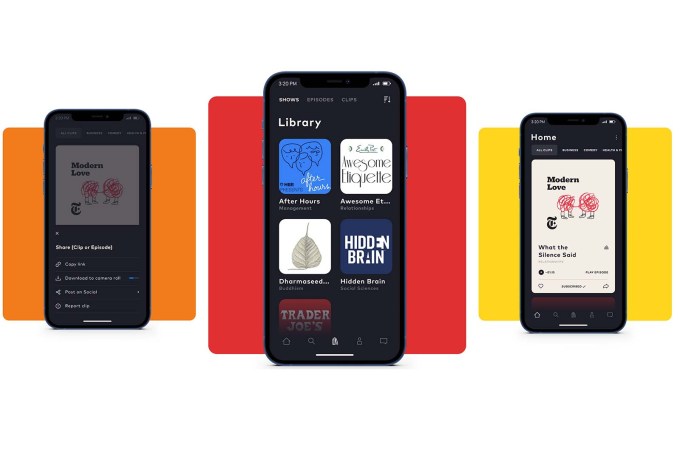
Image Credits: Moonbeam
Kayak’s co-founder Paul English this week officially launched Moonbeam, a podcast discovery app that leverages a combination of machine learning and human curation to create a newsfeed-style stream of audio content, similar to Podz. Podcasters can also select clips of their shows to feature on the app. Plus, the app allows fans to tip creators directly — and Moonbeam doesn’t take a cut. The app learns what sort of podcasts you may like based on how you interact with those it features, so your recommendations improve over time. Moonbeam can also serve as your podcast player, offering the ability to play back full episodes.
Reading Rec’s
Tweets
Gives a boost to Amazon for more developers who will want apps there to leverage Windows. Probably most important partnership announced
— Michael Gartenberg (@Gartenberg) June 24, 2021
App Store revolution has been temporarily delayed.
Screenshots are back for the installed apps in the search results in iOS 15.0 beta 2 pic.twitter.com/DDvk1brQgK
— ilia kukharev (@ilyakuh) June 25, 2021
(Quick, painful aside: On the podcast I explained that Apple completely broke the method @LaunchCenterPro has been using for Home Screen customization. We now have to remove the feature from the app and somehow explain it to our users who paid for that feature. It’s crushing.) pic.twitter.com/k5nOVZHDXz
— David Barnard (@drbarnard) June 23, 2021








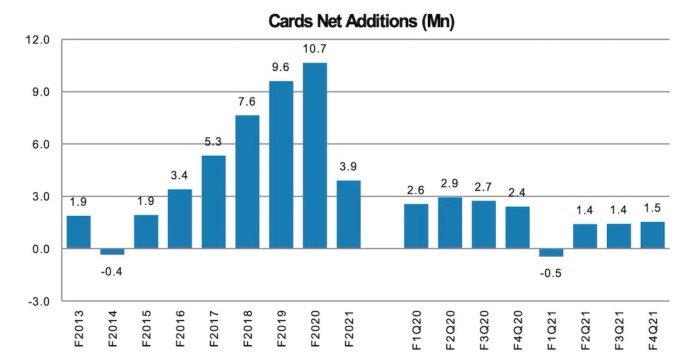
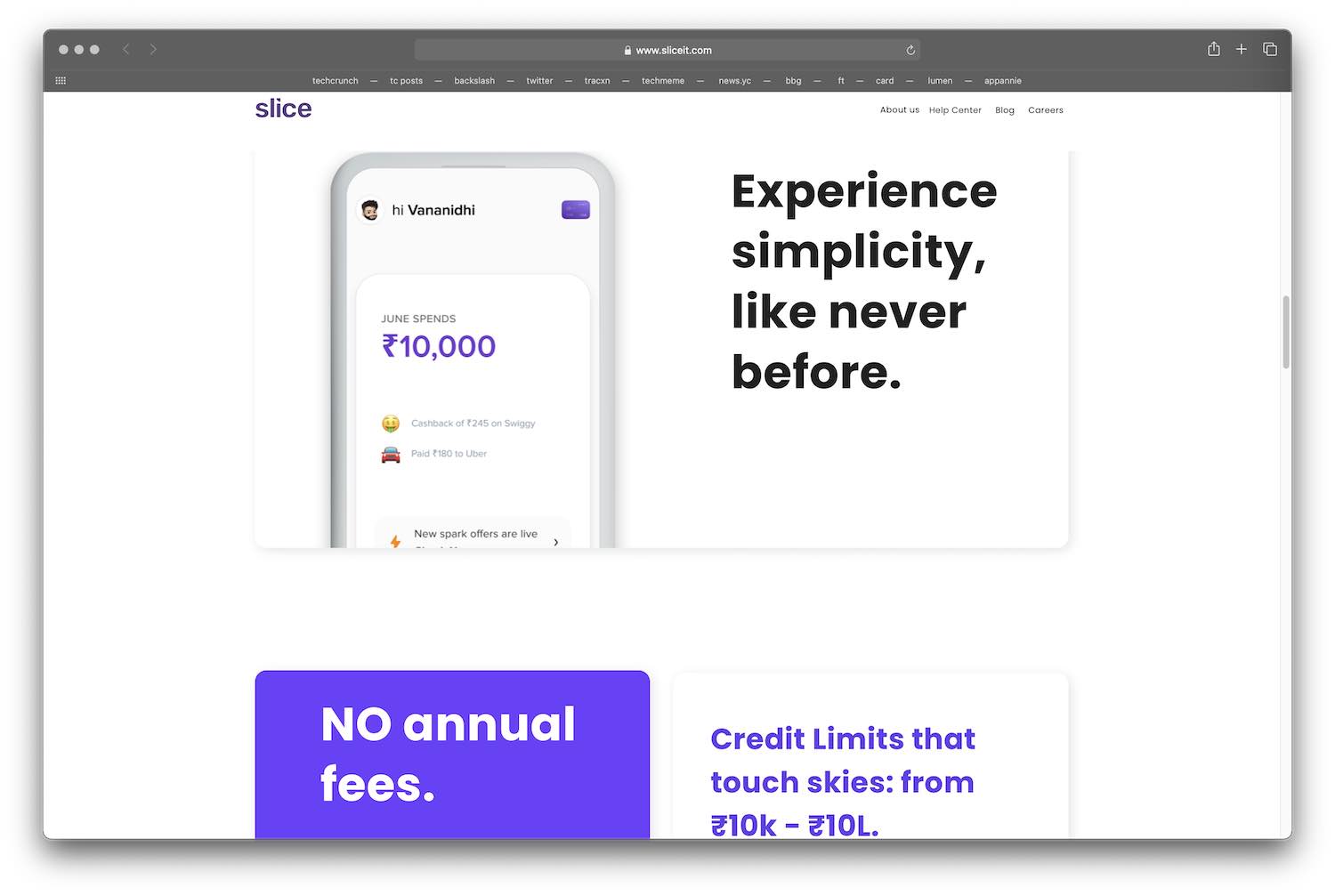



 Apple this week published a
Apple this week published a  MAJORITY
MAJORITY  EA
EA 



